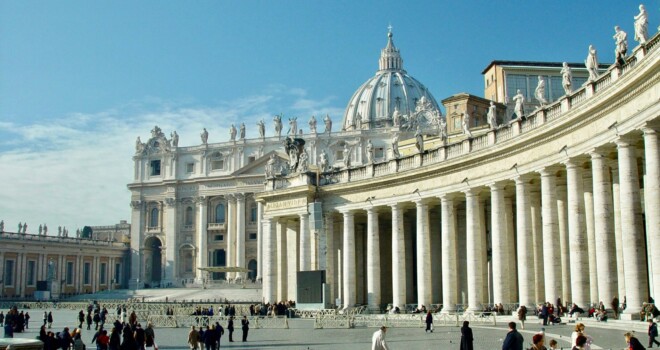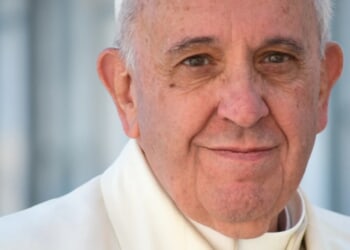As we well know, on April 21st, 2025, Easter Monday, Pope Francis died after a stroke and heart attack. I was somewhat shocked and deeply saddened at the news. Like many of you, I thought Pope Francis was healing and would be with us a few more months or even years, albeit in a more limited capacity. That was not God’s plan. Instead, our papa’s long, strenuous pilgrimage was at an end.
Now we are in a period we call “interregnum,” between the reigns of pope #266 and pope #267. And as the Chair is vacant, we pray for the coming conclave, for the cardinals and that God’s will be done as they vote to fill the Chair once again.
It is one of those strange moments to be a Catholic in mourning, when the rest of the world is either fascinated, sympathetic, or indifferent, but not feeling the same loss of a papa that we are. At the pinnacle of the liturgical year, our Easter has taken a decidedly different turn. No doubt countless families throughout Church history have had tragedy strike during Easter, and they know this strange experience. Now, Church-wide, we are experiencing the glory of Resurrection, alongside the sorrow of great loss.
We do not want you to be unaware, brothers, about those who have fallen asleep, so that you may not grieve like the rest, who have no hope. (1 Thes. 4:13)
In this Jubilee year of Hope, given to us by Pope Francis, we grieve the loss of him, but not without that crucial virtue of hope. While we are not required to love the pope, but only to respect him, see him as the Vicar of Christ, pray for him, and be obedient to his authoritative teachings, it is virtuous to love him. As God would have it, when we pray for someone, we tend to grow in love for that person. So, if we have made it a virtuous habit to pray for the pope daily, even though we may not agree with him on certain things, we will have found, by grace, that our love for him has grown.
Because of this, when a pope dies, any pope, a Catholic who is daily striving for virtue is likely going to feel the grace of sorrow and enter a period of mourning that is not merely observed but felt. He is our papa. Even when people have difficult relationships with their familial fathers they tend to go into a period of mourning when he dies.
So as a Church, we find ourselves in a strange but providential season of mourning during the height of the Easter season. I say providential because it is God who has called Pope Francis home. So, what are we to receive from this grace, this strange gift of mourning the loss of our papa on Easter Monday?
The Tension of Already-but-Not-Yet
As children of our Father God, we believe that we already possess every spiritual blessing Christ died to give us. However, living in this earthly realm, our experience of what we possess is limited. This tension is the in-between time from Jesus’ Ascension and His triumphal return at the end of time. It is accomplished, but our experience is not yet realized. We live in a graced but strange time interregnum, between Christ’s reign on the Cross and His assuming that reign eternally on earth.
Describing the stance we are called to take during this interregnum, this already-but-not-yet time, Daniel Harrington wrote:
This is not a stance of anxiety or fear. Rather, it is a stance of hope, trust and confidence that what God has begun in Jesus’ life, death and resurrection (the “already”) God will surely bring to a glorious completion in the future (the “not yet”). (America magazine, November 13, 2016)
Already but not yet is where we plant our virtue of HOPE. This is not a hope of “well I doubt it, but I hope so,” but of “I believe it will come to fruition according to God’s glory and in His perfect timing.”
This greater interregnum is reflected now, prophetically, in the Church as we move from the reign of Pope Francis to the reign of our next Holy Father. We engage true Christian hope that God will provide precisely the pope we need for this time in salvation history. We experience the mourning and sadness alongside the joy of the Resurrection, just like the already-but-not-yet tension of being a hopeful Christian in this valley of tears we call home.
If non-Catholics are fascinated, it is for good reason! This is existential stuff! Most people know some sort of filial love. Perhaps all know grief and loss. But Christian hope speaks to the longing each heart is created with for the not-yet in the middle of the already.
In the coming days and weeks may we each try to live fully, experience deeply the grace of mourning and loss, as well as the hopeful anticipation of what God has planned next. May we also try to cooperate with the grace to freely talk about it with anyone who is interested. That interest and fascination is a grace given by the God who loves them. May we place our lights on the empty Chair and be open to sharing whatever God gives us to share with whomever God brings us to share it with.
Lord, please bless our beloved papa, Francis. Thank you for his service to the Church at this time in salvation history. May we move through this time of mourning and sadness, with deep Easter joy and hope for the not-yet of the next pope’s reign. May we be your lights, as we go to the margins and love like Pope Francis taught us to. May we make our papa proud, and serve you, our Lord and God, in this time of already-but-not-yet.
Photo by Arnold Straub on Unsplash















